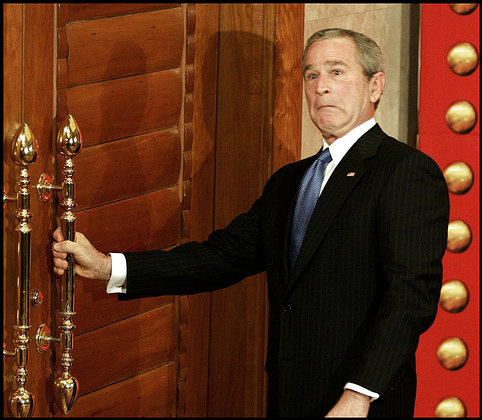After Good Night & Good Luck and Syriana, how can George Clooney continue his hot streak? Easy…direct a Coen brothers script. Upon wrapping Stephen Soderbergh’s The Good German, Clooney will take a swing at Suburbicon, a Coen project that’s been in mothballs.
Month: November 2005
Ticket to Ride.
The new teaser for Cars is online. I’m not really feeling it, but after the Toy Storys, Finding Nemo, and The Incredibles, I’ll give Team Pixar the benefit of the doubt.
Silent Night, Deadly Night.

Coming as it does from the director of Caddyshack and Groundhog Day, Harold Ramis’ The Ice Harvest is a surprisingly mordant and misanthropic piece of work. If your tastes run along such lines (as mine do), it’s an enjoyable neo-noir reminiscent of Blood Simple, one that’s fitfully amusing but rarely laugh-out-loud funny. But, particularly after seeing Goblet and Syriana, The Ice Harvest also feels somewhat unrealized and, for the most part, instantly forgettable. As 2 Days in the Valley and Things to do in Denver When You’re Dead are to Pulp Fiction, this movie is to Fargo…at best, it’s the type of movie you might find yourself watching on cable one thoroughly miserable holiday evening.
In a nutshell, The Ice Harvest plays like Grand Theft Auto: Wichita. (Or, put another way, it answers the question, “What if Kansas were more like Oz?”) As the film begins, we meet up with the Pushing Tin duo of John Cusack and Billy Bob Thornton — here a mob lawyer and pornographer respectively — soon after they’ve acquired over $2 million of ill-gotten loot from the coffers of the local mafioso (Randy Quaid). All they have to do is wait out the night — Christmas Eve — on account of an ice storm (which doesn’t seem to prevent them from driving around much), before skipping town for warmer climes. So, Cusack decides to hit up various strip clubs and nightspots — including one run by Wichita femme fatale Connie Nielsen (as always, deserving of better roles) and another frequented by Cusack’s alcoholic buddy (and second husband to his ex-wife) Oliver Platt (doing a variation on his Huff character) — all the while evading the mob’s muscle (Mike Starr, playing to form).
The first half of The Ice Harvest moves languorously, but it feels like it’s building to something. But…unfortunately, it’s not. Around the midway point, right when we seem to be achieving narrative momentum, the movie instead starts somewhat remorselessly killing off many of the characters we’ve recently met. Indeed, entire plotlines seem jettisoned (Cusack’s ex-wife, the incriminating photograph) in favor of a high body count. And, frankly, by the time the last folks standing get to the final, bloody shootout, I had pretty much checked out. There are definitely some amusing episodes along the way, and special marks go to Oliver Platt’s comic lush and Billy Bob Thornton’s usual brand of weary resignation (particularly involving his wife). But as a whole, The Ice Harvest just doesn’t hang together. I’m as up for a Christmas dish served ice-cold as anyone, but this harvest, despite signs of early promise, comes up fallow.
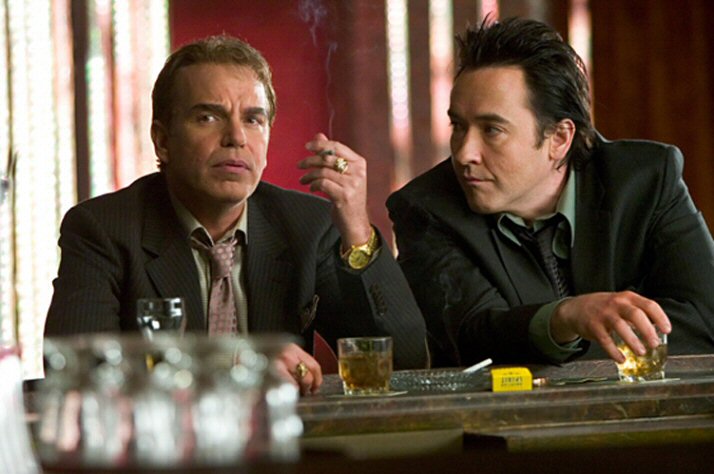
Almost Blue.

As seen at many fine blogs this past Thanksgiving week (including FmH & Medley), some nice visual data to be thankful for (and for all those red state/blue state dualists to ponder): One year after Election 2004, America’s blue over Dubya.
The Oil Down the Desert Way.
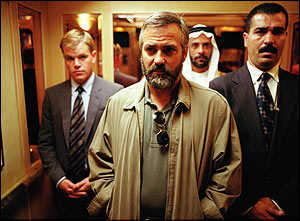 While perhaps a bit too dry and convoluted for some tastes, Stephen Gaghan’s Syriana is, IMHO, a top-notch political thriller that’s easily one of the best films of the year. Admitedly, the movie is missing some of the Soderberghian visual flourishes that made the very similar Traffic so memorable, and the movie definitely can be tough to follow. But, in a way, that’s part of its charm — Like the film’s protagonists, we only occasionally glimpse the shadowy tendrils of the beast that is Big Oil, and come to share their despair that it can ever be subdued. In sum, like the other recent Clooney outing, Good Night, and Good Luck, Syriana is both an intelligent, compelling work of cinema and a enthralling piece of social commentary, one that not only feels pertinent but necessary.
While perhaps a bit too dry and convoluted for some tastes, Stephen Gaghan’s Syriana is, IMHO, a top-notch political thriller that’s easily one of the best films of the year. Admitedly, the movie is missing some of the Soderberghian visual flourishes that made the very similar Traffic so memorable, and the movie definitely can be tough to follow. But, in a way, that’s part of its charm — Like the film’s protagonists, we only occasionally glimpse the shadowy tendrils of the beast that is Big Oil, and come to share their despair that it can ever be subdued. In sum, like the other recent Clooney outing, Good Night, and Good Luck, Syriana is both an intelligent, compelling work of cinema and a enthralling piece of social commentary, one that not only feels pertinent but necessary.
As you probably know, the movie jetsets around the globe following several facets of the oil trade and its consequences. In Beirut, an aging, disgruntled CIA agent (a stout George Clooney, resembling in Stephanie Zacharek’s words a “depressed circus bear”) starts to ask questions above his pay-grade about the collateral damage from a recent operation. In Geneva, after a family tragedy, a fresh-faced energy analyst (Matt Damon) becomes consigliere to the ambitious heir (Alexander Siddig) of a Middle-Eastern emirate. In Washington DC, a resourceful lawyer (Jeffrey Wright) begins due diligence work on an merger between two oil firms (the smaller headed by Chris Cooper). And, on the oil fields themselves, an increasingly desperate Pakistani emigrant (Mazhar Munir) begins to contemplate drastic action to change his fortunes, and those of his family.
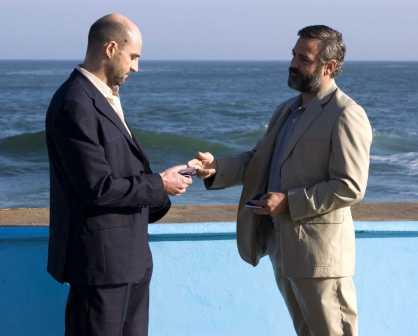 Along the way, Syriana‘s narrative is further fractured by the comings and goings of other famous faces, including Amanda Peet as Damon’s suffering wife, William Hurt as another grizzled agency vet, Tim Blake Nelson as the poster child for Abramoff‘s America, and Christopher Plummer as an insider among insiders. But, even though Plummer comes closest to being the Cigarette Smoking Man of this particular conspiracy tale, Syriana doesn’t offer any quick fixes or easy answers to the often grim story that unfolds. Some of our heroes find redemption or closure, true, but others become resigned to their fate, or even corrupted. And, ultimately, there is no Big Reveal or cathartic Speaking-Truth-To-Power scene to offer solace to the audience — Instead, we’re confronted with a system that, for better or worse, lumbers on, oblivious to either the machinations or the protests of mere individuals.
Along the way, Syriana‘s narrative is further fractured by the comings and goings of other famous faces, including Amanda Peet as Damon’s suffering wife, William Hurt as another grizzled agency vet, Tim Blake Nelson as the poster child for Abramoff‘s America, and Christopher Plummer as an insider among insiders. But, even though Plummer comes closest to being the Cigarette Smoking Man of this particular conspiracy tale, Syriana doesn’t offer any quick fixes or easy answers to the often grim story that unfolds. Some of our heroes find redemption or closure, true, but others become resigned to their fate, or even corrupted. And, ultimately, there is no Big Reveal or cathartic Speaking-Truth-To-Power scene to offer solace to the audience — Instead, we’re confronted with a system that, for better or worse, lumbers on, oblivious to either the machinations or the protests of mere individuals.
Depressing, indeed, even despairing at times, this film still feels like a story that must be told. And while viewers may quibble with some of the details of Gaghan’s Tarbell-esque expose of the political economy of oil, hopefully most will agree: We need more movies like Syriana.
Murtha’s Law.
“It almost doesn’t matter whether withdrawing or redeploying the troops is a good idea; it’s simply going to happen because there is no way for it not to happen (short of a major act of political will, such as reviving the draft or keeping troops on the battlefield beyond reasonable endurance). This is what Murtha meant when he told Russert, ‘We’re going to be out of there, we’re going to be out of there very quickly, and it’s going to be close to the plan that I’m presenting right now.'” Cutting through the congressional anger and the “cut and run” cheapshots, Slate‘s Fred Kaplan explains exactly what John Murtha called for last week, and why. “John Murtha’s proposal leaves open a lot of questions, but — seen for what it really says, not for how it’s been portrayed — it’s a start.”
No more Dodges / inCurious George.
“I was trying to escape. Obviously, it didn’t work.” If it’s any consolation, Dubya, we all feel just as trapped. In one of those resounding visual metaphors that capture a presidency and that life occasionally kicks up for all to see (the last one being Dubya’s fiddling during Katrina), our leader gets stymied by a locked door while trying to evade a reporter’s questions about his China trip (which were pretty softball, given all the things he could’ve been asking these days.)
In somewhat related news, in the relatively sanguine Post story about the door incident, the following depressing information is included: “In five years in the presidency, Bush has proved a decidedly unadventurous traveler…As he barnstormed through Japan, South Korea and China, with a final stop in Mongolia still to come, Bush visited no museums, tried no restaurants, bought no souvenirs and made no effort to meet ordinary local people…[Laura Bush] once persuaded him to go to the Hermitage Museum in St. Petersburg, only to see him burn through the place in 30 minutes. He dispensed with the Kremlin cathedrals in Moscow in seven minutes. He flatly declined an Australian invitation to attend the Rugby World Cup while down under.”
The “Little Triumvirate.”
“This was a huge ‘Congress getting into the ballgame’ week,’ Mr. Graham said. Mr. Warner said wryly, ‘You know, Congress is a co-equal branch.'” Well, make no mistake: They’re no Clay, Calhoun, and Webster. Still, the NYT takes a gander at the self-named “Little Triumvirate” of John McCain, Lindsey Graham, and John Warner, three “Gang of 14” members who’ve become the locus of GOP discontent with Dubya in the Senate.
Truth-Challenged Cheney (Again).
“What was striking about Cheney’s assault was that while denying critics’ charges of manipulation and dishonesty involving prewar intelligence, he resorted to exactly the tactics that inspired the criticism. As he did with the prewar intelligence, Cheney told no outright lies, but he exaggerated the case, picked only evidence he liked, and ignored the caveats.” In case it wasn’t obvious, Slate‘s John Dickerson explains how Cheney is still misrepresenting the lead-up to war. (In fact, he did it again today, although at least he didn’t join his congressional colleagues in their recent spate of Murtha-bashing.) But, really, can we expect any less from the administration that brought us imaginary WMDs and the phantom Iraq-9/11 connection? Like George Costanza at his worst moments, these jokers have been lying so long they’ve lost sight of the truth.
Yo, you got the big guy.
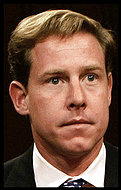 “I never file taxes! What’s the big deal?” No, no, he just looks like Inconsiderate Cell Phone Man (Rob Huebel). The Post profiles Abramoff/DeLay flunky Michael Scanlon, who pleaded guilty today to fraud charges he picked up last Friday, and will soon act as a witness for the prosecution. “His cooperation…increases pressure on Abramoff to make his own deal with the prosecution…[Scanlon] may not have been privy to all of DeLay’s dealings with Abramoff, a lobbyist the Texas lawmaker once called ‘one of my closest and dearest friends.’ But Scanlon could be a guide to the activities of top House GOP staffers, some of whom are now lobbyists and political consultants who work closely with DeLay, now the former majority leader.”
“I never file taxes! What’s the big deal?” No, no, he just looks like Inconsiderate Cell Phone Man (Rob Huebel). The Post profiles Abramoff/DeLay flunky Michael Scanlon, who pleaded guilty today to fraud charges he picked up last Friday, and will soon act as a witness for the prosecution. “His cooperation…increases pressure on Abramoff to make his own deal with the prosecution…[Scanlon] may not have been privy to all of DeLay’s dealings with Abramoff, a lobbyist the Texas lawmaker once called ‘one of my closest and dearest friends.’ But Scanlon could be a guide to the activities of top House GOP staffers, some of whom are now lobbyists and political consultants who work closely with DeLay, now the former majority leader.”

